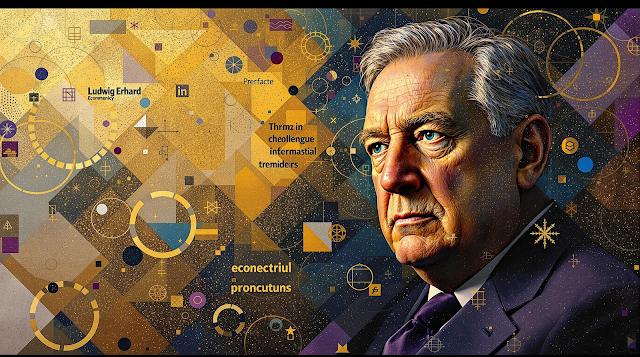"A compromise is the art of dividing a cake in such a way that everyone believes he has the biggest piece." - Ludwig Erhard.
"타협이란 케이크를 나누는 기술로, 모든 사람이 자신이 가장 큰 조각을 가졌다고 믿게 만드는 것이다." - 루드비히 에르하르트.
The Art of Compromise: Ludwig Erhard's Cake Metaphor
Ludwig Erhard (1897-1977) was a German economist and politician who served as Chancellor of West Germany from 1963 to 1966. Often credited as the father of the German economic miracle (Wirtschaftswunder), Erhard's policies helped transform post-World War II Germany from a devastated nation into an economic powerhouse. As Minister of Economics under Konrad Adenauer and later as Chancellor, he championed the concept of the social market economy, balancing free market principles with social welfare considerations—a philosophy reflected in his nuanced understanding of compromise.
루트비히 에르하르트(1897-1977)는 1963년부터 1966년까지 서독 총리를 역임한 독일 경제학자이자 정치인이었습니다. 종종 독일 경제 기적(Wirtschaftswunder)의 아버지로 불리는 에르하르트의 정책은 제2차 세계대전 이후 황폐화된 국가였던 독일을 경제 강국으로 변모시키는 데 도움을 주었습니다. 콘라드 아데나워 하에서 경제부 장관으로, 그리고 나중에 총리로서, 그는 자유 시장 원칙과 사회 복지 고려사항의 균형을 맞추는 사회적 시장 경제 개념을 옹호했습니다—이는 타협에 대한 그의 미묘한 이해에 반영된 철학입니다.
The Essence of True Compromise
"A compromise is the art of dividing a cake in such a way that everyone believes he has the biggest piece." With this elegant metaphor, Erhard captures the essence of successful negotiation and conflict resolution. True compromise isn't merely about splitting differences or making concessions—it's about creating solutions where each party feels their core interests have been satisfied. The genius lies not in equal division, but in perception management and creative problem-solving that leaves everyone feeling they've gained something valuable.
"타협은 모든 사람이 자신이 가장 큰 조각을 가졌다고 믿도록 케이크를 나누는 예술이다." 이 우아한 은유를 통해, 에르하르트는 성공적인 협상과 갈등 해결의 본질을 포착합니다. 진정한 타협은 단순히 차이를 분할하거나 양보하는 것이 아니라—각 당사자가 자신의 핵심 이익이 충족되었다고 느끼는 해결책을 만드는 것입니다. 그 천재성은 동등한 분할이 아니라, 모든 사람이 가치 있는 것을 얻었다고 느끼게 하는 인식 관리와 창의적인 문제 해결에 있습니다.
The Psychology of Satisfaction
Erhard's insight acknowledges the psychological dimension of compromise. Human satisfaction depends not only on objective outcomes but on subjective perceptions. We evaluate our gains not in absolute terms but relative to our expectations and what others receive. A skillful mediator understands this psychology and crafts agreements that address both substantive needs and emotional concerns. When people believe they've received fair or preferential treatment, they're more likely to commit to and uphold the agreement.
에르하르트의 통찰력은 타협의 심리적 차원을 인정합니다. 인간의 만족은 객관적인 결과뿐만 아니라 주관적인 인식에도 달려 있습니다. 우리는 우리의 이득을 절대적인 조건이 아니라 우리의 기대와 다른 사람들이 받는 것에 상대적으로 평가합니다. 숙련된 중재자는 이러한 심리를 이해하고 실질적인 요구와 감정적 우려를 모두 다루는 합의를 만듭니다. 사람들이 공정하거나 우선적인 대우를 받았다고 믿을 때, 그들은 합의에 전념하고 유지할 가능성이 더 높습니다.
Beyond Zero-Sum Thinking
The cake metaphor initially suggests a zero-sum situation—more cake for one person means less for others. However, Erhard's emphasis on perception hints at a more sophisticated approach. Effective compromise often involves expanding the cake before dividing it, finding synergies and complementary interests that create additional value. By reframing issues, introducing new variables, or identifying shared principles, negotiators can transform seemingly intractable conflicts into mutually beneficial agreements.
케이크 은유는 처음에 제로섬 상황을 제안합니다—한 사람에게 더 많은 케이크는 다른 사람들에게 더 적은 케이크를 의미합니다. 그러나, 에르하르트의 인식에 대한 강조는 더 정교한 접근법을 암시합니다. 효과적인 타협은 종종 케이크를 나누기 전에 확장하는 것, 추가 가치를 창출하는 시너지와 상호 보완적인 이익을 찾는 것을 포함합니다. 문제를 재구성하고, 새로운 변수를 도입하거나, 공유된 원칙을 식별함으로써, 협상가들은 겉보기에 다루기 힘든 갈등을 상호 이익이 되는 합의로 변환할 수 있습니다.
Compromise in Leadership and Governance
For Erhard, compromise wasn't merely a negotiation tactic but a governance philosophy. As a leader rebuilding a fractured nation, he understood that sustainable policies required balancing competing interests. His social market economy exemplified this approach—preserving the dynamism of markets while ensuring social cohesion. Effective leaders, like skilled cake-cutters, must find solutions that different constituencies can embrace, creating broad stakeholder buy-in rather than narrow victories.
에르하르트에게, 타협은 단순한 협상 전술이 아니라 통치 철학이었습니다. 분열된 국가를 재건하는 지도자로서, 그는 지속 가능한 정책이 경쟁적인 이익의 균형을 필요로 한다는 것을 이해했습니다. 그의 사회적 시장 경제는 이러한 접근법을 예시했습니다—시장의 역동성을 보존하면서 사회적 결속을 보장하는 것. 숙련된 케이크 커터처럼, 효과적인 지도자들은 다양한 구성원들이 수용할 수 있는 해결책을 찾아, 좁은 승리가 아닌 광범위한 이해관계자의 지지를 창출해야 합니다.
Conclusion
Erhard's cake metaphor reminds us that compromise is both an art and a science. It requires technical skill in problem-solving, psychological insight into human satisfaction, and creative vision to expand possibilities. In our increasingly polarized world, this wisdom offers a valuable perspective. Perhaps the measure of a truly successful compromise isn't whether everyone gets exactly what they want, but whether everyone walks away believing they've received a fair—or even generous—slice of the cake.
에르하르트의 케이크 은유는 타협이 예술이자 과학임을 상기시킵니다. 그것은 문제 해결에 있어 기술적 기술, 인간 만족에 대한 심리적 통찰력, 그리고 가능성을 확장하기 위한 창의적 비전을 필요로 합니다. 점점 더 양극화되는 우리 세계에서, 이 지혜는 가치 있는 관점을 제공합니다. 아마도 진정으로 성공적인 타협의 척도는 모든 사람이 정확히 원하는 것을 얻는지가 아니라, 모든 사람이 공정하거나 심지어 관대한 케이크 조각을 받았다고 믿으며 떠나는지일 것입니다.







